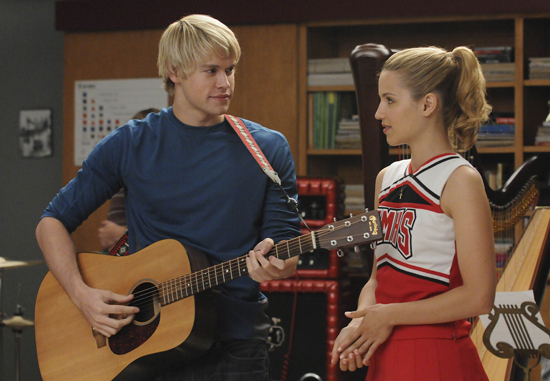The magical thing about writing fiction, in any medium, is that you can make things up. You can introduce and remove characters whenever you wish, you can infuse actions and objects and dialogue with symbolic meaning, you can arrange events in a deliberate and satisfying manner. You can, in other words, make a good story.
I prefer to see writers taking advantage of these opportunities, and I think I’m not alone here. I appreciate narratives that move about and develop, with characters who grow and change and learn and forget and rise and fall and approximate in some way the people we meet in real life. I look for dramatic tension and true-seeming endings, and I grow frustrated when writers seem to care about none of these things.
As you might have guessed by now, I’m talking about “Glee.”
It began with so much promise, Fox’s little misfit of a show about a high school glee club, dashing out from the gates with 13 manic and delightfully absurd episodes that shook the Etch A Sketch displaying the old rules of television. A weekly, hour-long musical was suddenly viable. Stereotypes could be broken and perpetuated at the same time. Journey’s “Don’t Stop Believin'” could be associated with something other than the series finale of “The Sopranos.”
But then “Glee” took a four-month break, and when it returned it was clear that the outcasts had earned a seat at the cool kids’ table. Not the characters ““ they still attracted flying slushies in the hallways of McKinley High ““ but the show itself.
Creator Ryan Murphy no longer had to seek out songs for the show; major artists were coming to him. It was only a matter of time, then, before “Glee” introduced what has become its fatal flaw, the themed episode. The queens of pop, Madonna and Britney Spears, have each had their own; Britney’s episode consisted almost entirely of the glee kids re-enacting her music videos while under sedation at the dentist.
These days, it’s all about the music, a characteristic much better suited to rock bands than TV shows. It’s been some time now since “Glee” had a coherent plot, or even a point. The show has become a weekly collection of music videos, interspersed with seemingly random and inconsequential romantic pairings, moving toward nothing. It is essentially television’s first fictional reality show, “American Idol” combined with “Flavor of Love.”
I set out last week to confirm my suspicion that everyone agrees with me about this. I ventured to Sunset Patio on the afternoon on Friday and approached a few groups of students seated innocently at the tables outside of Bruin Café. The first two did not watch “Glee.”
But then I happened upon Henry Okoroike, a first-year biology student, and Noemi Ferman, a first-year undeclared life sciences student. I asked them what they thought of the show’s recent episodes; Ferman called them cheesy, Okoroike said they were trying too hard to be cool.
When I suggested that the problem might be a total lack of plot, they smirked, as if they’d already had a conversation about that very subject. In the spirit of good journalistic ethics, I considered my theory proven.
One reason for optimism, though: when I went home that afternoon and watched last week’s episode of “Glee,” titled “Duets,” I discovered a rare extra helping of things actually happening.
The brightest spot, as she has been from the beginning, was Dianna Agron, continuing to make a fascinating human being of the once-disgraced head cheerleader Quinn Fabray. And with a new love interest, Chord Overstreet’s Sam Evans, blessed with Justin Bieber’s hair and Steven Tyler’s lips, we should be seeing more of Quinn these next few weeks.
There was, in some sense, a theme to the episode ““ as you might have guessed, the glee club had to sing duets ““ but it was used in this case to explore the relationships between characters, rather than to work certain songs into the show. The writers, for the first time in a while, were acting like writers.
This should be a sign of better things to come, it seems, until you notice that next week, the glee club takes on “The Rocky Horror Picture Show.”
“Pop Psychology” runs every Monday. If you wish “Glee” had an actual plot more often than it does, e-mail Goodman at agoodman@media.ucla.edu.
